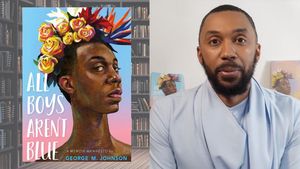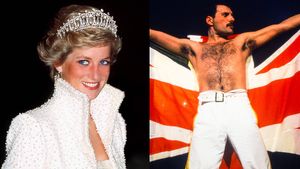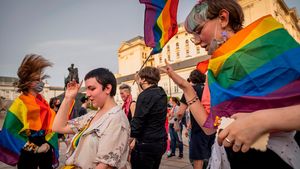I pay U.S. taxes. Even so, the Supreme Court decided in June that I am a second-class citizen. Taxes are mandated even when living abroad, and the U.S. twists the knife deeper by being one of the few countries to tax foreign income as well as domestic. So the only time I am forced to think about my home country is when I have to pay up — and when bad news comes.
When the Supreme Court ruling reached me in Berlin, it was a reminder of how much home can hurt, how it can wound over great distances. I always try to shop queer, but the U.S. just made it personal. If my money must be spent, it will go to businesses owned by queers or ones that support us all year, not just when everyone sticks a rainbow flag in the window.
The ruling made me think about the businesses I can trust. I get my jewelry from Cartography.nyc, which donates a percentage of all sales to queer organizations, all year long. Mark, its gay owner, lives in Brooklyn and can now face legal discrimination in America for being both an immigrant and a gay man. He moved to New York City with $200 and spent his first week sleeping in Central Park. Now his earnings pay his pit bull’s medical bills — the dog has epilepsy — as well as the salaries of his team. Mark is the American dream, the American story, yet the country just told him a Christian can refuse to carry his products, deny him service, and kick him out.
Cartography is safe to buy from because I know Mark. But I do not know all the faceless people behind the corporations that run America (or Germany), nor do I really want to. At some point in my money’s life, it must go to someone who thinks I am a hell-bound miscreant, a social disease. Incidentally, I think the same of them: believers, zealots, all of them. A disease.
So, the line is drawn. The only way I know to fight back is with money. If businesses discriminate, starve them. Boycott them. Let them die.
I tried making a list of businesses to stick with, but it was too short — too few to live on. I had nearly given up when I opened my underwear drawer and saw one that I knew was not only proudly queer but had shaped my identity. It was a clothing brand worn by most queer men I knew, as commonplace to me as Tommy Bahama and Olive Garden are to straights — so common that I had forgotten how important it was, how deeply it mattered. There was life before Nasty Pig and life after it.
When I was closeted, I feared wearing anything that might be seen as gay. In college, away from home and freer, I was still afraid of being feminine, but I was ready to feel sexy. The bravery to wear heels and dresses would come later. At that time, I only wanted men at the gay bar to know I was hunting. I wanted to take a first step. Knowing this, an older gay man gave me my first Nasty Pig jockstrap.
I saw it on him first and thought it was hot. The one he gave me was his — unwashed, rich in his smell. I did not know then how scent is tied to the jockstrap fetish. A jockstrap is best loved dirty.
In varsity football, I wore athletic supporters, which were different. They were sport wear with uncomfortable plastic cups to protect my genitals. A Nasty Pig jockstrap nodded campily to the athletic supporter, but it was the gay version, aware of its sexiness. Wearing one was, then and now, an act of identification. It said, “I am looking for sex. Come sniff the new meat.”
But it was just a first step. It did not force me to confront my fear of femininity because it was not feminine. I still see the brand as a kind of sartorial stepping stone: the first nonheterosexual item of clothing a closeted or newly out gay man wears. In its advertising and branding, Nasty Pig is pretty cisgender — gay rather than queer, at least in our modern lexicon. The NP look has evolved, but its earlier style was punk and fetish — party clothes for NYC gays with buzz cuts and bullrings in their noses.
But it mattered. The saying “clothes make the man” has been espoused by everyone from Mark Twain to Homer. But my Nasty Pig jock did not make me what I am. It did more than that. It shaped the question What am I? I still ask this, years later. I have not found a word that summarizes me, but whatever it is, it is wrapped up in sex, freedom, and nonapology. I am not, strictly speaking, gay. I have sex — and sometimes romance — with persons of all genders. And though I am fairly masculine, I like to play with my masculinity: I wear feminine clothes sometimes and like to be feminized in sex.
Some would say I am textbook queer. But nowadays, “queer” comes with a vague leftist political slant that, though hard to define, is a potent part of the term. I share that slant, but I do not want the word for my sexuality to speak for my politics too — something I think queer people should be wary of. A nuanced political perspective cannot be said in a word.
“Fluid” feels closer to my truth, but it does not ring in my heart and loins like “f****t” during sex. No word feels more perfect than “pig” when I am being a nasty pig. Sex words — dirty ones — fit me best.
I did not know when I wore that first jockstrap that the brand, that clothes, would be a signpost for my identity. But that is what clothes do. For reasons we cannot always explain, clothes are signs, signals, guides to finding who we are. They are just fabric and buttons. Sometimes it is the fit or color that does it. But an article of clothing can be an act of great bravery — even a life-threatening one. Our trans family members know this. For me, wearing a Nasty Pig jockstrap felt like being out and unafraid. No matter what the item of clothing is, I hope every queer person finds that thing, that look, that makes them feel the same.
As I considered the Nasty Pig jock in my drawer, it seemed, at first, a silly thing to pin hope on. But it was not silly at all. It was a battle plan against hate because it proved the same thing that all queer clothing proves: that our community comes together in dark times with visual codes, marks of kinship. The NP logo mattered because it meant an “us” against a “them.” The rainbow flag, the trans flag, kinky leather harnesses, bear paws, biohazard tattoos, drag, lipstick, and heels, and even the silly gay trends that fall in and out of style each year matter because, together, they are the uniform. Thus armored, we fight. We’re here, we’re queer, get used to it.
Alexander Cheves is a writer, sex educator, and author of My Love Is a Beast: Confessions from Unbound Edition Press. @badalexcheves
This article is part of the Out September/October issue, available on newsstands August 29. Support queer media and subscribe — or download the issue through Amazon, Kindle, Nook, or Apple News.




















































